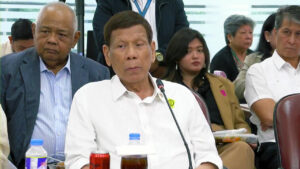Philippines says it’s obliged to comply if Interpol seeks Duterte arrest on drugs
THE PHILIPPINE government on Wednesday said it would not stand in the way if former President Rodrigo R. Duterte wants to surrender to the International Criminal Court (ICC), and would be obliged to comply if his arrest was sought over his deadly war on drugs.

By Kenneth Christiane L. Basilio, Reporter
THE PHILIPPINE government on Wednesday said it would not stand in the way if former President Rodrigo R. Duterte wants to surrender to the International Criminal Court (ICC), and would be obliged to comply if his arrest was sought over his deadly war on drugs.
President Ferdinand R. Marcos, Jr.’s office issued the statement hours after the tough-talking leader told a House of Representatives hearing he is not scared of the ICC, telling it to “hurry up” on its investigation of his administration’s alleged crimes against humanity.
It said it would be willing to consider handing Mr. Duterte over if an Interpol request was made.
“The government will feel obliged to consider the red notice as a request to be honored, in which case the domestic law enforcement agencies shall be bound to accord full cooperation,” Executive Secretary Lucas P. Bersamin said in the statement.
This was the first time the Philippine government has suggested it would cooperate with the ICC, which last year cleared the way for an investigation into the bloody campaign that defined Mr. Duterte’s 2016-2022 presidency.
Mr. Duterte when president unilaterally withdrew the Philippines from the ICC in March 2019 after it opened a preliminary examination of the drug killings. The court has said its prosecutors have jurisdiction over alleged crimes committed before the withdrawal.
In the statement, Mr. Bersamin said the government would neither object nor block Mr. Duterte if he wished to surrender.
Mr. Duterte remained defiant during the hearing as he defended his illegal drug crackdown, which was a key plank of his election campaign, during which he had promised thousands would be killed.
He had promised to kill 100,000 criminals in his first six months in office and throw their bodies in Manila Bay that the fish there “will grow fat.”
“ICC does not scare me a bit,” he told congressmen. “They can come here anytime. I suppose that you would want to maybe make it easy for them to visit and start the investigation. I would welcome that,” Mr. Duterte said.
“I have nothing to hide. What I did, I did it for my country and for the young people. No excuses. No apologies. If I go to hell, so be it.”
The 79-year old said he was getting impatient, and asked ICC to “hurry up” and “come here and start the investigation tomorrow.” “I’ll go to the ICC myself, they’re taking so long. Hurry up! Because I might get old and die before they could investigate me.”
According to police data, more than 6,200 people died in anti-drug operations under Mr. Duterte, during which police typically said they had killed suspects in self-defense. Human rights groups say as many as 30,000 drug suspects died.
“I assume full responsibility for whatever happened in the actions taken by law enforcement agencies of this country to… stop the serious problem of drugs affecting our people,” Mr. Duterte said.
The ex-President’s remarks on the ICC was a highly political move, said Josue Raphael J. Cortez, a lecturer at the School of Diplomacy and Governance of De La Salle-College of St. Benilde. “It’s surprising but understandable given the circumstances he faces right now. The 2025 midterm election is just around the corner,” he said in a Facebook Messenger chat.
“Mr. Duterte is falling back on his usual bravado rhetoric. All of this is for him to appear fearless to his remaining support base,” Hansley A. Juliano, who teaches politics at the Ateneo de Manila University, said via Messenger chat. “ It’s the only way he and his family can remain credible to his support base.”
“Mr. Duterte’s change of position on the ICC investigation will definitely be sort of a clarion call for the Philippine government — that public opinion now will revolve on whether the Philippines will once again be part of the Rome Statute,” Mr. Cortez said. — with Kyle Aristophere T. Atienza and Reuters
















